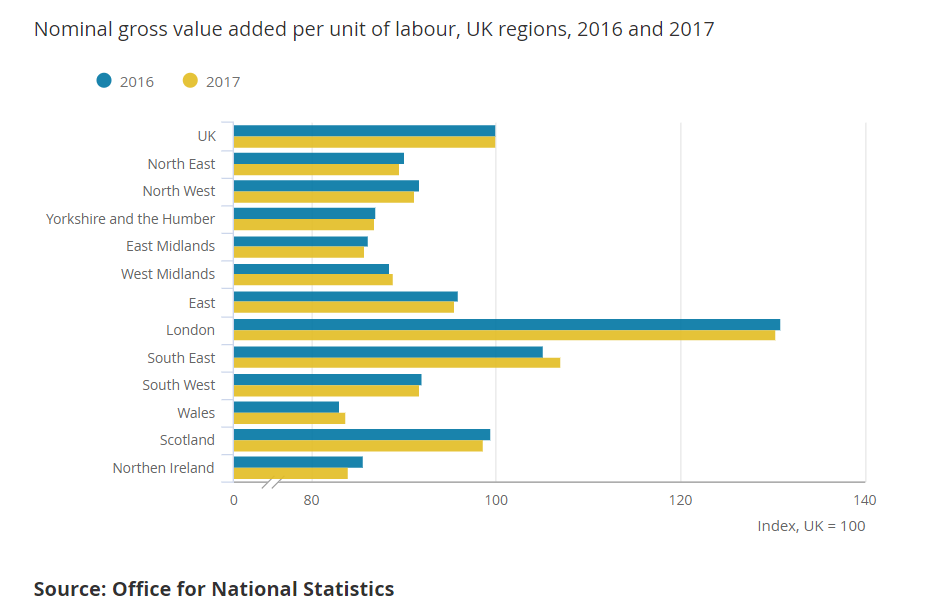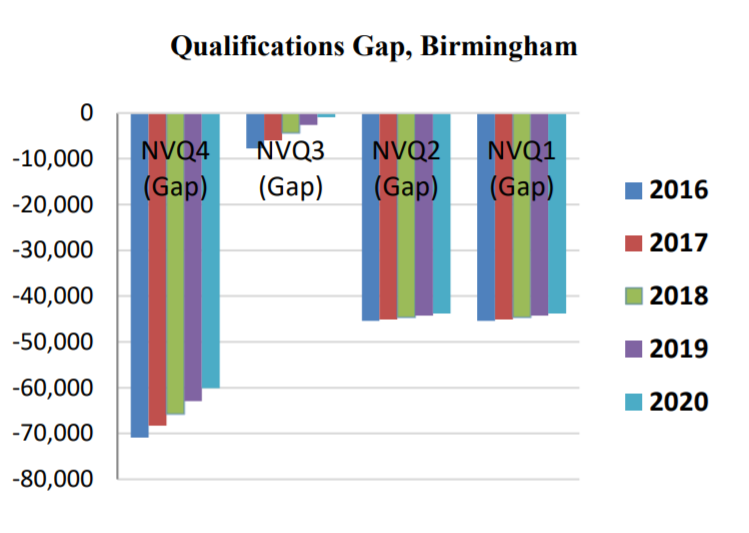Chloe Billing reflects on this year’s Regional Studies Association’s annual conference in Santiago de Compostela.
On the 6th June, I had the opportunity to present the findings from the first phase of City REDI’s project on ‘Productivity and Prosperity’ at the RSA conference in Santiago. Details of the ESRC funded project and the wider team can be found on our project page.
The central aim of the overall project is to identify local factors that underlie and explain regional differences in productivity, with a particular focus on mismatches between the supply of and demand for specific skills. Additionally, it considers key trade-offs between productivity improvement and inclusive growth goals. The City-REDI team aims to do this by addressing the following research aims:
- Investigate how features of regional labour markets, especially skills, act as productivity constraints at the firm level, across different business functions and industry sectors.
- Examine the specific misalignments at the regional level between the supply of and demand for particular kinds of labour/ skills
- Examine the motivations and outcomes of decisions about investment in skills and other factors and how these can stimulate improvements in productivity and – ideally – inclusive growth.
 Productivity is a benchmark used by many commentators to compare the UK’s economic performance with our international peers and output per hour is a standard measure. The UK lags behind most OECD countries in terms of average productivity and productivity growth rates; on average, each UK worker produces around a third less per hour than French, German and American Workers. Productivity matters because productivity growth helps to offset inflation, improves public finances and increase the standard of living.
Productivity is a benchmark used by many commentators to compare the UK’s economic performance with our international peers and output per hour is a standard measure. The UK lags behind most OECD countries in terms of average productivity and productivity growth rates; on average, each UK worker produces around a third less per hour than French, German and American Workers. Productivity matters because productivity growth helps to offset inflation, improves public finances and increase the standard of living.
Inclusive Growth focuses on “enabling as many people as possible to contribute to and benefit from growth”. It is driven by the concerns about the scale and consequences of inequality and is an attempt to shape growth such that higher-performance and redistribution are simultaneous. Our research will explore whether there is an opportunity to deliver inclusive productivity growth. Is this possible?
City-REDI’s project focuses on the West Midlands as a case study, working with local businesses and policymakers. Our focus on the West Midlands can partly be explained by our interest in our ‘home region’, but also the particular related challenges that the region faces. These include:
- The GVA per head in the Midlands is one of the lowest in the country, less than £21k per head compared to over £43K in London (ONS, 2017).
- The West Midlands had an unemployment rate of over 5.1% in the final quarter of 2018 (compared to 3.9% for the UK overall);
- 16% of its population has no qualifications (compared to 9% nationally).

The Regional Studies Association conference presentation was the outcome of the first phase of our 3-year project and was based on a detailed review of the academic and grey literature by the research team. It has been an important step since it has provided us with the foundation to begin our data collection in the summer. This will involve a survey of 300 firms (business and professional services, advanced manufacturing, retail and hospitality) in the West Midlands on their productivity, innovation and skills needs. The survey will be followed with semi-structured interviews of 50 firms, providing a ‘deep-dive’ into the constraints on their productivity at the local level.
Our presentation first explored how skills and regional labour markets act as productivity constraints at the firm level. It highlighted the close relationship between workforce skills level and productivity performance. McGuinness et al. (2018) argues that “skill gaps may harm productivity due to lower output per worker, which also tends to inflate average labour costs”. Consequently, investment in education, training and workforce upskilling is likely to have a positive effect on productivity levels and growth rates. There are of course many other factors that influence productivity growth, including:
- Knowledge and Innovation
- Management Practices
- Open Data
- Agglomeration
- Urbanisation
These all, in some way, relate to skills and regional labour markets. For instance, the shortage of the provision of skills will impede the innovation capability development and productivity of regions and firms. Our project focuses on this link between innovation, skills and productivity. Specifically, when labour-related approaches to innovation and improved productivity are challenged by local skills shortages does this stimulate:
- Increased investment in training and development of existing staff, new recruitment strategies, etc.? Or
- The adoption of non-labour approaches, such as capital equipment investments, process re-engineering or changes in product / service focus?
- And, would either of these approaches achieve inclusive productivity growth?
There are significant regional variations in educational outcomes and skills, at all education levels, with significant shortages in the West Midlands (Abreu, 2018; Sevinc, 2018). We are not only interested in the shortage of skills, but more so the mismatch between those skills demanded by firms and those actually attained through the education and training system i.e. Is there a skills misalignment in the West Midlands? McGowani et al (2015) suggested that “higher skill mismatch is associated with lower labour productivity through a less efficient allocation of resources. For example, there is a shortage of digital skills to take advantage of open data systems in the service and manufacturing sector (Baresford, 2015). Additionally, there is a shortage of non-cognitive or “soft” skills (personality traits, self-efficacy, and resilience) in the labour market, which are different to cognitive skills (numerical, verbal, and problem-solving skills) and (Payne, 2017).

Our presentation then considered the key trade-offs between productivity improvement and inclusive growth goals. There is a link between productivity and pay, whereby increasing productivity remains a direct method of increasing wages (particularly for middle-income workers). However, productivity is improved if the least skilled become unemployed, so running counter to the goal of inclusive growth. Conversely, there is a clear relationship between employment growth and lower productivity, there is no guarantee that the gains from productivity will be broadly shared across the UK economy. As a result, new thinking and empirical approaches are needed along with research evidence which can support policy and industry implementation in delivering (if possible) inclusive productivity growth. This is a key driver for our research.
This research on productivity is one part of a wider portfolio of research at City-REDI investigating productivity issues. For example, Anne Green and Amir Qamar at Birmingham worked with Paul Sissons and Kevin Broughton at Coventry University on raising productivity in low-wage sectors and reducing poverty. They found that many firms had only a partial understanding of productivity and that uprating in the National Living Wage had prompted firms to seek ways to increase productivity.
I was joined at RSA with colleagues from City-REDI who also presented on their ongoing projects. Tasos Kitsos organised a special session, together with Raquel Ortega-Argilés on Regional Economic Resilience: Latest Developments and New Research Frontiers. Tasos presented his paper with André Carrascal-Incera and Raquel on the role of local economic embeddedness on regional resilience and receive useful feedback and ideas for further research. Tasos presented a second paper on his work with Antonios Proestakis on the role of political alignment on intergovernmental transfers in Greece His blog on his RSA experience can be found here. Raquel Ortega-Argilés presented her work with Silvia Rocchetta and Dieter Kogler on the non-linear effects of relatedness on regional performance. Anne Green also discussed work with George Bramley on the challenges of out-migration and demographics on securing NHS staff in England’s rural areas.
References
– Abreu, Maria (2018) Skills and Productivity. Productivity Insights Network.
– Beresford, Maia (2015) New Local Government Network, Demystifying data: the data revolution and what it means for local government.
– Centre for Social Justice (2018) The great British breakthrough: driving productivity growth in the UK.
– Confederation of British Industry (2018) In perfect harmony: improving skills delivery in England.
– Hawking, M. (2019) Briefing: how local industrial strategies can deliver inclusive growth, Joseph Rowntree Foundation (JRF)
– McGowan, A. (2015) Labour Market Mismatch and Labour Productivity: Evidence from PIAAC Data, in OECD Economics Department Working Papers, OECD Paris.
– McGuinness, S., K. Pouliakas, and P. Redmond, SKILLS MISMATCH: CONCEPTS, MEASUREMENT AND POLICY APPROACHES. 2018. 32(4): p. 985-1015.
– McSorley, L (2018). Inequality, wellbeing and inclusive growth.
– Payne, Jonathan (2018) In the DNA or missing gene? Devolution, local skills strategies and the challenge of inclusive growth in England (Research paper no 126)
This blog was written by Dr Chloe Billing, Research Fellow at City-REDI.
Disclaimer:
The views expressed in this blog are those of the authors and not necessarily those of City-REDI or the University of Birmingham
To sign up for our blog mailing list, please click here

